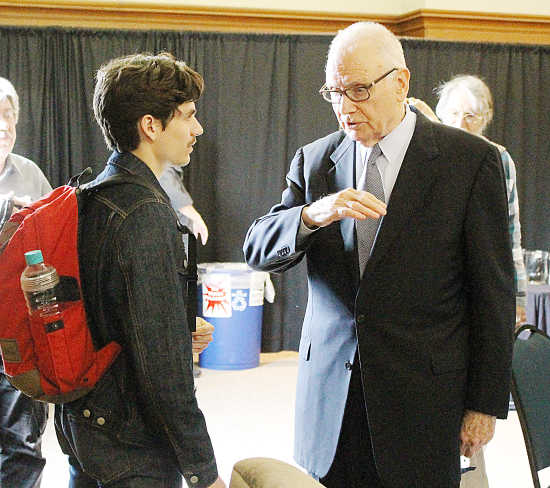Hamilton: U.S. can do more in Syrian crisis

Living up to a name like Mr. Integrity is a tough thing.
There's something in there about being a nice guy, but also an element of toughness when it's necessary. And honesty. Above all, honesty.
Having been given the lofty nickname by Newsweek a number of years ago, former U.S. Representative and 1952 DePauw graduate Lee Hamilton lived up to it with a Thursday visit to campus to discuss the Syrian crisis and its implications for U.S. immigration and asylum policy.
While the 34-year-veteran of Congress offered a sympathetic view of the tough job of lawmakers, he also pulled no punches on matters he believes are lacking from today's lawmakers.
"I believe we are at a time in a representative democracy when it is under a lot of stress," Hamilton said. "I suspect that you don't think Congress is doing a good job."
Hamilton went on to site a recent 8-percent approval rating for the country's legislature.
"I'm not sure I want to say I was in Congress," Hamilton said, before adding with a laugh, "No sane man would've stayed there for 34 years."
Seventeen years after he left Capitol Hill, Hamilton remains aware of the number of issues facing lawmakers. He told his crowd that the country is bigger, more complicated and the issues faster moving.
"It's very hard to make this country work."
With that said, Hamilton got down to the topic of the day, and he wasn't shy in his criticisms of Washington.
According to Hamilton's figures, the United States has allowed .06 percent of the Syrian refugees to enter its borders.
"Don't tell me the United States is doing its share. We're not coming close," Hamilton said.
Instead, he praised European leaders such as German Chancellor Angela Merkel for doing far more than the United states to help the crisis.
Speaking of the "moral obligation" to do something about such crises, Hamilton said it has to be a multi-pronged approach, including sending aid, accepting refugees and, perhaps most importantly, trying to help find solutions in the country being fled.
In such situations where intervention is required, Hamilton said he wants to see a commitment from the countries being helped.
"I'm not willing to send American lives all over the world unless we have a commitment that they're going to get their house in order," he said. "We cannot do it for them."
Specifically on the subject of refugees, Hamilton said that indications from politicians that allowing more refugees increases the terror threat are misguided.
"I think it's been exaggerated in many ways," Hamilton said. "But is it a real concern? Of course it is."
Citing the U.S.'s long and complicated vetting process for refugees, Hamilton praised the process. He said that presidential candidates who have said the process is sloppy are "wrong -- dead wrong."
"We don't like letting people into this country who don't look like us," he said.
Ultimately, Hamilton wants to see changes to U.S. immigration policy. Not only does this include an increase in the number of refugees -- while maintaining the current vetting process -- but an emphasis on the skilled workers we are allowing in.
Saying that family unification has long been the guiding principle of immigration policy, he would like to see an increased emphasis "on what's good for the future of America.
"I want to see us take immigration and use it as a tool," Hamilton said. "The tool is to make the country more competitive, more productive and more able to lead."
Even in a time of great stress in the country, the Congressman expressed his belief in the system, such as the recent fight between Gov. Mike Pence and the federal government over Syrian refugees.
"Usually the system works," Hamilton said. "The governor said, 'We're not going to let them in.' What did the court do? It said "You'd better let them in.'"
Asked about the bitter partisanship currently in the country, Hamilton said it is troubling, but it's part of the ebb and flow of politics.
"There are rhythms in American politics. We're at a low point right now," he said.
More than partisanship, Hamilton sees the influence of money as a current threat to democracy, asking "Who speaks for the common good."
Ultimately, it's about making the country work.
"As I've gotten older, I'm less concerned with whether you're a Republican or a Democrat," Hamilton said. "I've become less concerned with whether you're a conservative or a liberal or a moderate."
"What I want to know as you're sitting at that table, I want to know if you want to make this country work."
